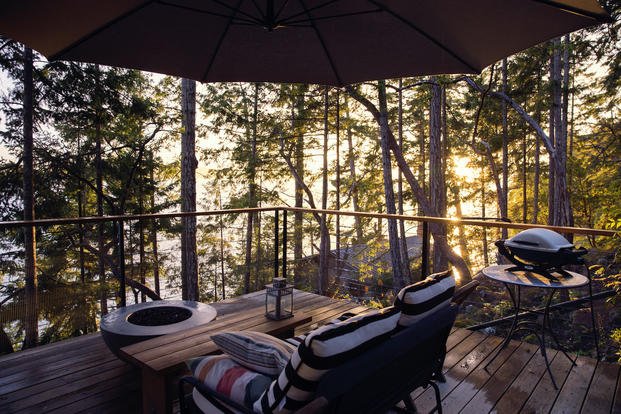After serving 30 years in the Army, veteran Bo Balcavage and his wife Kim needed a change. The couple moved across the globe for the military, living in 19 different houses in the process.
When it was time for Bo to retire, the pair wanted to pick a special place for their permanent home. They had no idea then that they'd end up sharing it with total strangers.
The Balcavages are Airbnb hosts; they make a business of renting out the bottom level of their house to short-term guests. It all started when the Pennsylvania natives moved to Cape Porpoise, Maine, and saw an opportunity to build a bottom-level suite for family visits and potential short-term guests.
Even then, they couldn't have expected the demand. The couple officially opened an Airbnb listing in June 2020, and they were quickly booked solid for the next six months. Kim estimates they've made about $40,000 from their side gig as hosts since then. They charge guests $175 per night and will soon be increasing their rates.
"I've always wanted to have bed and breakfast, but I'm not a morning person," said Kim Balcavage, who also runs a leadership development company with her husband. "When we retired, this was not on my radar, but in the back of my mind hosting people was always something I wanted to do, and I wanted to continue to meet new people."
Meanwhile, Coast Guard Petty Officer 1st Class Matthew Gibson and his wife and Alina also decided to give short-term rental hosting a try in the summer of 2020. The Louisiana-based couple purchased a condo on the beach near Pensacola, Florida, as a second home and crash pad for family and friends, but it often sat empty.
When the family listed the space on short-term vacation rental platforms, they were blown away by how quickly it filled up.
"Within hours, we were getting bookings, for hundreds of dollars a day even," Matthew Gibson said. The two enjoyed the hosting experience so much that they decided to make a retirement plan out of the venture. They already owned a long-term rental and found the vacation house was earning four times as much money with short-term guests. They purchased four more units in the beach town ahead of Matthew's terminal leave this June.
"That was a turning point for what we were going to do," said Matthew Gibson. "I was looking at government jobs, and now I'm going to go live on the beach. This is so much more hands-on, and I get to play a bigger part in my future versus a 9 to 5 job."
According to Airbnb, many military families are choosing similar paths. The service reported that 10% of hosts are active or retired military and collectively earned $40 million on the platform from January through September 2021.
However, the two host families caution that running a short-term rental isn't the right fit for all military families, and people should do their research before jumping in. Hosting usually requires a sizable investment upfront and entails a lot of work to keep visitors happy. Hosts need to do extensive research on ever-changing local and state short-term rental rules to ensure they're following the law. Units need to be fully furnished and styled, cleaned after every visitor and expertly marketed to remain competitive with the other rentals in the area.
"I think all the years of traveling while we were in the Army certainly taught me what I like about staying in certain places and what I don't like about staying at certain places," said Kim Balcavage. "I did a lot of research, which is one thing I recommend if people want to start their own. Research what other people are offering, read the reviews and see what people like about them, then do it better."
Both couples pressed that hosting is not passive income, and the host or management company needs to be nearby to respond to issues or requests. They believe it would be difficult for an active-duty service member to successfully manage a rental from a distance or on a deployment without a strong local team, which can be hard to find during the current labor shortage.
"I tell my family if you see me on my phone, I'm answering somebody's questions about where the ice is or something like that," added Alina Gibson, who is now an Airbnb Ambassador. "It's very hands-on for sure, and it takes a lot of upkeep. We've kept 120-plus families happy, and that's not easy to do."
Airbnb wants more retired and active-duty members to become hosts and has even formed partnerships with veteran career recruiting organizations Boots2Roots and Live and Work in Maine The platform has pledged to award up to $15,000 in free Airbnb stays for military families that are job or house hunting in the state.
"A lot of folks coming out of the military, even though they may not be experienced in business, are entrepreneurial and like to be self-sufficient," said Bill Benson, retired Army Colonel and executive director of Boots2Roots. "Hosting a rental is a chance to use something that you live in, in a beautiful place, to maintain the lifestyle you want. I think the opportunity is something that would be very appealing to folks coming out of the military."
Learn more about Airbnb's partnership with Boots2Roots and Live and Work in Maine.
-- Read the original article on MilitaryFamilies.com.
Keep Up with the Ins and Outs of Military Life
For the latest military news and tips on military family benefits and more, subscribe to Military.com and have the information you need delivered directly to your inbox.





















